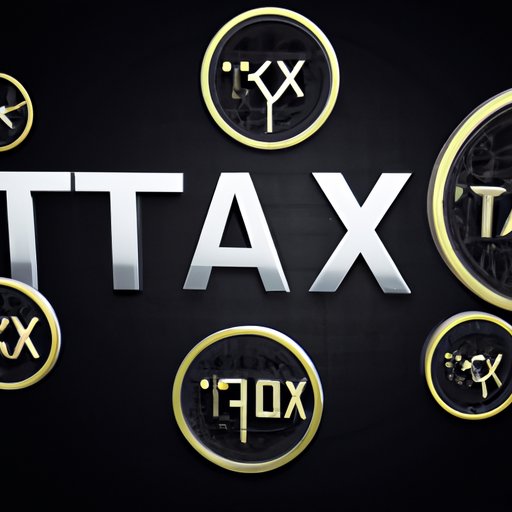Introduction
Cryptocurrencies are digital assets designed to work as a medium of exchange using cryptography to secure financial transactions, control the creation of additional units, and verify the transfer of assets. As cryptocurrencies become increasingly popular, crypto traders need to be aware of the tax implications of their activities. In this article, we will explore when do I pay tax on crypto, and provide an overview of the regulatory landscape of crypto taxation.

Understanding the Tax Implications of Crypto Trading
The Internal Revenue Service (IRS) considers cryptocurrencies to be property, not currency, for tax purposes. This means that any gains made from cryptocurrency trading, investing, or exchanging are subject to federal income tax. It is important for crypto traders to understand what types of crypto transactions are taxable, how crypto gains are taxed, and the difference between short-term and long-term gains.
What Types of Crypto Transactions are Taxable?
Any time a trader sells, exchanges, or disposes of a cryptocurrency, they may be subject to taxation. This includes transactions such as selling crypto for fiat currency, exchanging one type of crypto for another, or using crypto to purchase goods or services. Additionally, miners who receive rewards for verifying transactions on the blockchain are also liable for taxes on their earnings.
How Are Crypto Gains Taxed?
The amount of tax owed on crypto gains depends on the type of gain realized. Short-term gains, which are profits from investments held for less than one year, are taxed at the same rate as ordinary income. Long-term gains, which are profits from investments held for more than one year, are taxed at a lower rate than short-term gains.
What is the Difference Between Short-Term and Long-Term Gains?
Short-term gains are profits from investments held for less than one year, and are taxed at the same rate as ordinary income. Long-term gains are profits from investments held for more than one year, and are taxed at a lower rate than short-term gains. The specific rate depends on the investor’s marginal tax bracket.
What Crypto Traders Need to Know about Paying Taxes
Crypto traders must understand their tax responsibilities in order to properly report their gains and losses. This includes keeping accurate records of all crypto trades, reporting gains to tax authorities, and understanding applicable tax rates. We will now explore these topics in greater detail.
Keeping Records of Your Crypto Trades
It is important for crypto traders to keep detailed records of all their trades, including the date of the transaction, the type of cryptocurrency involved, the amount of money exchanged, and any fees associated with the trade. These records can be used to accurately calculate capital gains and losses for tax purposes.
Reporting Your Crypto Gains to Tax Authorities
Crypto traders must report their gains and losses to the IRS each year. This includes all crypto transactions over the course of the year, including buying, selling, exchanging, and mining. Failing to report crypto gains can result in penalties and interest.
Understanding Tax Rates on Crypto Gains
The amount of tax owed on crypto gains depends on the type of gain realized. Short-term gains are taxed at the same rate as ordinary income, while long-term gains are taxed at a lower rate. The specific rate depends on the investor’s marginal tax bracket.

How to Calculate and Pay Tax on Crypto Profits
In order to pay taxes on crypto profits, traders must first calculate their taxable gains. This involves subtracting the cost basis (the original value of the investment) from the proceeds (the sale price of the investment). Any resulting profit is considered taxable income. We will now discuss the steps involved in calculating and paying taxes on crypto profits.
Calculating Your Taxable Crypto Gains
The first step in calculating taxable crypto gains is to determine the cost basis of the investment. This is the original value of the investment, including any fees associated with the purchase. Once the cost basis has been determined, the trader must then calculate the proceeds, which is the sale price of the investment. The difference between the cost basis and the proceeds is the taxable gain.
Filing Tax Returns on Crypto Profits
Once the taxable gain has been calculated, the trader must then report it on their tax return. Depending on the jurisdiction, this may involve filing separate forms for capital gains and losses, or simply reporting the total gain or loss on the regular income tax form. It is important to accurately report all crypto transactions in order to avoid penalties and interest.
Paying Taxes on Crypto Profits
After filing the tax return, the trader must then pay the taxes owed on their crypto gains. This can usually be done online via a credit card or bank transfer. Depending on the jurisdiction, it may also be possible to pay taxes in cryptocurrency. It is important to make sure taxes are paid by the due date in order to avoid late payment penalties.

Navigating the Regulatory Landscape of Crypto Taxation
Crypto taxation varies across different jurisdictions, so it is important for crypto traders to stay up to date on the latest regulations. We will now explore the different approaches to crypto taxation, how recent tax regulations impact crypto investors, and the role of tax advisors in crypto taxation.
Different Approaches to Crypto Taxation Across Jurisdictions
Crypto taxation policies vary from country to country, with some countries taking a more lenient approach than others. For example, in the United States, crypto gains are subject to capital gains tax, while in Japan, crypto gains are exempt from taxation. It is important for crypto traders to research the relevant laws in their jurisdiction before trading.
How Recent Tax Regulations Impact Crypto Investors
Recent changes to crypto taxation have had a significant impact on crypto investors. For example, the US recently introduced new rules that require crypto traders to report any gains or losses on their tax returns. As such, it is important for crypto traders to stay up to date on the latest regulations in order to ensure they are compliant with the law.
The Role of Tax Advisors in Crypto Taxation
Tax advisors can help crypto traders navigate the regulatory landscape of crypto taxation. They can offer advice on the best strategies for minimizing tax liability, as well as provide assistance with filing taxes on crypto gains and losses. It is important to seek professional advice when dealing with complex tax matters.
The Impact of Tax Laws on Cryptocurrency Investments
Crypto traders must be aware of the tax implications of their activities in order to maximize their returns. We will now explore the factors that affect the amount of tax owed on crypto gains, how tax laws can determine the success or failure of crypto investments, and strategies for minimizing crypto tax liability.
Factors that Affect the Amount of Tax Owed on Crypto Gains
The amount of tax owed on crypto gains depends on several factors, including the type of gain realized, the investor’s marginal tax bracket, and the jurisdiction in which the investor resides. It is important to understand these factors in order to accurately calculate the amount of tax owed.
How Tax Laws Can Determine the Success or Failure of Crypto Investments
Tax laws can have a significant impact on the success or failure of crypto investments. For example, high tax rates on crypto gains can reduce the overall return on investment, while generous tax incentives can encourage more people to invest in cryptocurrencies. As such, it is important to stay up to date on the latest tax regulations.
Strategies for Minimizing Crypto Tax Liability
There are several strategies that crypto traders can use to minimize their tax liability. This includes taking advantage of tax deductions, deferring gains until the next tax year, and utilizing tax-loss harvesting. It is important to consult with a qualified tax advisor to determine the best strategy for minimizing crypto tax liability.

Keeping Track of Your Crypto Tax Liabilities
In order to properly manage their crypto tax liabilities, crypto traders need to stay organized and keep accurate records of all their trades. We will now discuss the use of crypto tax software to track gains and losses, staying up to date on changes to crypto tax legislation, and seeking professional advice on crypto tax matters.
Using Crypto Tax Software to Track Gains and Losses
Crypto tax software can be used to track crypto gains and losses, generate reports, and calculate taxes owed. This can save crypto traders time and effort, as well as help them to accurately report their crypto transactions. It is important to compare different crypto tax software solutions to find the best one for your needs.
Staying Up to Date on Changes to Crypto Tax Legislation
Crypto taxation policies are constantly evolving, so it is important for crypto traders to stay up to date on the latest regulations. This includes researching the relevant laws in their jurisdiction, monitoring changes to crypto tax legislation, and consulting with a qualified tax advisor.
Seeking Professional Advice on Crypto Tax Matters
Crypto tax matters can be complicated, so it is important to seek professional advice if you are unsure of your obligations. Tax advisors can provide guidance on the best strategies for minimizing tax liability, as well as assist with filing taxes on crypto gains and losses.
Common Mistakes to Avoid When Paying Tax on Crypto Gains
Crypto traders must be aware of their tax responsibilities in order to ensure they are compliant with the law. We will now discuss some of the common mistakes to avoid when paying taxes on crypto gains.
Not Understanding Tax Responsibilities as a Crypto Trader
One of the most common mistakes crypto traders make is failing to understand their tax responsibilities. This includes not keeping accurate records of crypto trades, not reporting gains to tax authorities, and not understanding applicable tax rates. It is important to research the relevant laws in your jurisdiction to ensure you are compliant with the law.
Not Keeping Accurate Records of Crypto Trades
Another common mistake is not keeping accurate records of all crypto trades. This includes the date of the transaction, the type of cryptocurrency involved, the amount of money exchanged, and any fees associated with the trade. It is important to keep detailed records of all your trades in order to accurately calculate your capital gains and losses.
Incorrectly Estimating Crypto Tax Liability
Crypto traders must also be careful not to incorrectly estimate their crypto tax liability. This can result in owing more taxes than necessary, or even worse, facing penalties and interest for underreporting or failing to report crypto gains. It is important to consult with a qualified tax advisor to ensure you are accurately calculating your tax liability.
Conclusion
Crypto traders must understand the tax implications of their activities in order to ensure they are compliant with the law. This includes keeping accurate records of all crypto trades, reporting gains to tax authorities, and understanding applicable tax rates. Additionally, crypto traders should be aware of the different approaches to crypto taxation across jurisdictions, how recent tax regulations impact crypto investors, and the role of tax advisors in crypto taxation. Finally, there are strategies for minimizing crypto tax liability, such as taking advantage of tax deductions, deferring gains until the next tax year, and utilizing tax-loss harvesting. By following these guidelines, crypto traders can ensure they are properly managing their crypto tax liabilities.
(Note: Is this article not meeting your expectations? Do you have knowledge or insights to share? Unlock new opportunities and expand your reach by joining our authors team. Click Registration to join us and share your expertise with our readers.)
